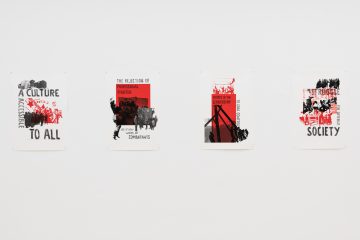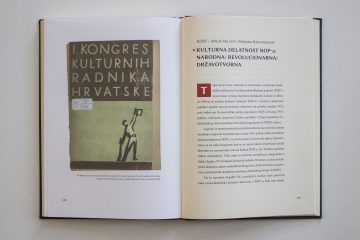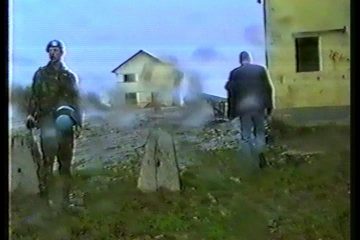—————–
How to Revolutionize Art. Collective Practice and Political Organization of Artists in the Interwar Period in Yugoslavia
—————–
Im Rahmen ihrer künstlerischen Investigation zur Kultur der Partisan_innenbewegung in Jugoslawien mit dem Titel Lessons in Defense wird das Künstler_innenkollektiv KURS eine Kunsthistorikerin und eine Kuratorin zu Gast haben, die sich in ihrer Forschung mit progressiven Künstler_innengruppierungen der 1930er Jahre aus Zagreb und Belgrad beschäftigen, die wiederum einen Einfluß auf die Kultur der Partisan_innen während des Zweiten Weltkriegs ausgeübt haben.
Die Präsentation von Vida Knežević wird eine Untersuchung theoretischer und praktischer Aspekte der kritischen Linken in der jugoslawischen Kultur beinhalten, die die komplexen Beziehungen kritischer Kunstpraktiken in der Zwischenkriegszeit und die politischen Praktiken des kollektiven Korpus der revolutionären sozialen Bewegung reflektieren soll. Die Fallstudie nimmt die illegale Künstler_innengruppe Život (1934 – 1940) in den Fokus. Diese entwickelte sich in einer Zeit staatlicher Repression und Zensur als heterogene Künstler_innengruppe mit pluralistischen ästhetischen Standpunkten, die die Idee von Kunst als sozialer Praxis vertrat, die für einen Klassenkampf mit künstlerischen und politischen Mitteln eintritt. Die künstlerische und politische Alltagspraxis der Gruppe kann als historisches Beispiel dafür dienen, wie wir uns heutzutage die Beziehungen zwischen künstlerischen Inhalten und Formen sowie den Begriff kollektiver Kunst und die Frage der politischen Organisation von Künstler_innen vorstellen können.
Diese Präsentation hören Sie in der März Ausgabe vom Büchs’n’Radio.
—————–
How to Revolutionize Art. Collective Practice and Political Organization of Artists in the Interwar Period in Yugoslavia
—————–
In the context of their artistic investigation into the partisan culture in Yugoslavia titled Lessons in Defense, the KURS collective will host two guests who are researching about progressive artistic groups from Zagreb and Belgrade form 1930’s that influenced the partisan culture during World War II. After an introduction by KURS (Miloš Miletić and Mirjana Radovanović), Vida KNEŽEVIĆ (art historian) and Vesna VUKOVIĆ (curator) will talk about the illegal group Život (Life) respectively and the Zemlja Artists‘ Association.
The subject of the presentation is an examination of the theory and practice of the critical Left in Yugoslav culture. This examination will evolve by deliberating the complex relations of critical art practices during the interwar period as well as the political practices of the collective body of revolutionary social movements. The case study focuses on the illegal group Život (1934 – 1940) which emerged in times of state repression and censorship as a heterogeneous art group with pluralistic stands on the question of aesthetics, and organized around the idea of art as social practice that advocates a class struggle using artistic and political means. The group’s everyday artistic and political practice can give us a historic example of how we could think of today’s relations of artistic content and form, the notion of collective art, and the question of political organizing of artists.
In this broadcast you will hear the presentation of KURS (Miloš Miletić and Mirjana Radovanović) and Vida KNEŽEVIĆ.













